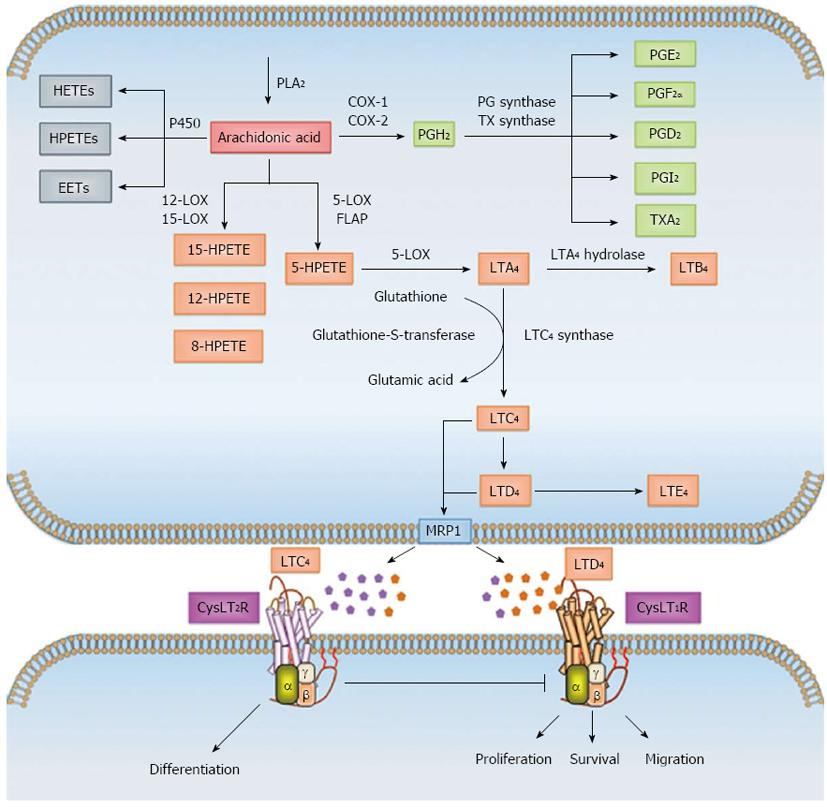Copyright
©2014 Baishideng Publishing Group Co.
World J Gastroenterol. Jan 28, 2014; 20(4): 968-977
Published online Jan 28, 2014. doi: 10.3748/wjg.v20.i4.968
Published online Jan 28, 2014. doi: 10.3748/wjg.v20.i4.968
Figure 1 Overview of arachidonic acid metabolism.
Arachidonic acid (AA) is a polyunsaturated fatty acid found in the phospholipids of cell membranes. AA is mobilized into the cytoplasm mostly by the activation of calcium-dependent cytosolic phospholipase A2 (cPLA2). Free AA in the cytosol can be enzymatically metabolized to eicosanoids through three major pathways: the cytochrome P450, cyclooxygenase (COX) and/or 5-lipoxygenase (5-LOX) pathways. In the P450 pathway, AA is metabolized to epoxyeicosatrienoic acids (EETs), hydroxyeicosatetraenoic acids (HETEs) and hydroperoxyeicosatetraenoic acids (HPETEs). In the COX pathway, AA is enzymatically converted to the intermediate prostaglandin H2 (PGH2), which is then sequentially metabolized to prostanoids, including prostaglandins (PGs), such as PGE2, PGF2, PGD2 and PGI2, and thromboxanes (TXs) such as TXA2 by specific prostaglandin and thromboxane synthases. In the LOX pathway, AA is metabolized by 12- and 15-LOX to 8-, 12- and 15-HPETE or by 5-LOX and 5-lipoxygenase activating protein (FLAP) to intermediary 5-HPETE. 5-HPETE is further processed to form leukotrienes (LTs), the first of which is the unstable leukotriene A4 (LTA4). LTA4 is subsequently converted to leukotriene B4 (LTB4) by LTA4 hydrolase or together with glutathione to leukotriene C4 (LTC4) by LTC4 synthase and glutathione-S-transferase. LTC4 is converted by ubiquitous enzymes to form leukotriene D4 (LTD4) and leukotriene E4 (LTE4). The members of the multidrug resistance-associated protein (MRP) family are efflux transporters for both PGs and LTs. The cysteinyl leukotrienes (CysLTs) LTC4, LTD4 and LTE4 act via G protein-coupled receptors CysLT1R and CysLT2R at the cell surface and induce different signaling mechanisms.
- Citation: Savari S, Vinnakota K, Zhang Y, Sjölander A. Cysteinyl leukotrienes and their receptors: Bridging inflammation and colorectal cancer. World J Gastroenterol 2014; 20(4): 968-977
- URL: https://www.wjgnet.com/1007-9327/full/v20/i4/968.htm
- DOI: https://dx.doi.org/10.3748/wjg.v20.i4.968









